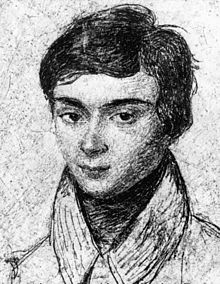Galois
| Évariste Galois | |
|---|---|

A portrait of Évariste Galois at the age of about 15
|
|
| Born |
25 October 1811 Bourg-la-Reine, French Empire |
| Died | 31 May 1832 (aged 20) Paris, Kingdom of France |
| Nationality | French |
| Fields | Mathematics |
| Alma mater | École préparatoire (no degree) |
| Known for | Work on the theory of equations and Abelian integrals |
| Signature | |
Évariste Galois (French: [evaʁist ɡaˈlwa]; 25 October 1811 – 31 May 1832) was a French mathematician born in Bourg-la-Reine. While still in his teens, he was able to determine a necessary and sufficient condition for a polynomial to be solvable by radicals, thereby solving a problem standing for 350 years. His work laid the foundations for Galois theory and group theory, two major branches of abstract algebra, and the subfield of Galois connections. He died at age 20 from wounds suffered in a duel.
Galois was born on 25 October 1811 to Nicolas-Gabriel Galois and Adélaïde-Marie (born Demante). His father was a Republican and was head of Bourg-la-Reine's liberal party. His father became mayor of the village after Louis XVIII returned to the throne in 1814. His mother, the daughter of a jurist, was a fluent reader of Latin and classical literature and was responsible for her son's education for his first twelve years. At the age of 10, Galois was offered a place at the college of Reims, but his mother preferred to keep him at home.
In October 1823, he entered the Lycée Louis-le-Grand, and despite some turmoil in the school at the beginning of the term (when about a hundred students were expelled), Galois managed to perform well for the first two years, obtaining the first prize in Latin. He soon became bored with his studies and, at the age of 14, he began to take a serious interest in mathematics.
...
Wikipedia
